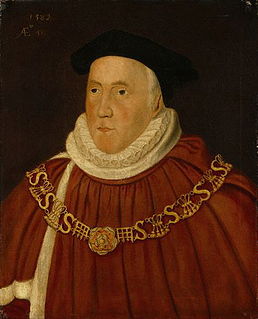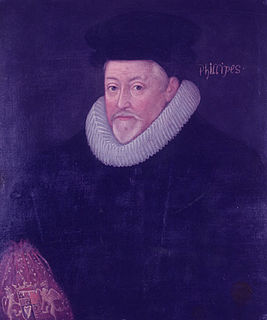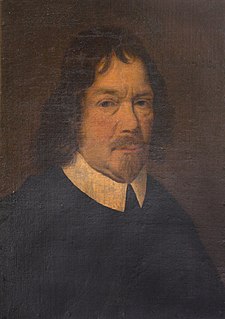Related Research Articles

Sir Julius Caesar was an English lawyer, judge and politician who sat in the House of Commons at various times between 1589 and 1622. He was also known as Julius Adelmare.
Sir Henry Billingsley was an English merchant, Lord Mayor of London and the first translator of Euclid into English.

Matthew Hutton (1529–1606) was archbishop of York from 1595 to 1606.

Sir Christopher Wray was an English judge and Chief Justice of the King's Bench.

Sir Edward Phelips was an English lawyer and politician, the Speaker of the English House of Commons from 1604 until 1611, and subsequently Master of the Rolls from 1611 until his death in 1614. He was an elected MP from 1584, and in 1588, following a successful career as a lawyer, he commissioned Montacute House to be built as a Summer house for himself and his family. He was knighted in 1603 and one of his major roles was as the opening prosecutor during the trial of the Gunpowder Plotters.

Sir Richard Hutton was a Yorkshire landowner, and judge. He defied Charles I over ship money.
Sir Rowland Lytton was an English lawyer and politician who sat in the House of Commons variously between 1586 and 1611.
Sir Robert Wroth was an English politician.
John Trenchard of Warmwell, near Dorchester was an English politician who sat in the House of Commons at various times between 1621 and 1659.

Sir William Pole (1561–1635) of Colcombe House in the parish of Colyton, and formerly of Shute House in the parish of Shute, both in Devon, was an English country gentleman and landowner, a colonial investor, Member of Parliament and, most notably, a historian and antiquarian of the County of Devon.
Sir John Evelyn (1591–1664) was an English politician who sat in the House of Commons at various times between 1628 and 1660. He reluctantly supported the Parliamentary side in the English Civil War.
Sir Edward Tyrrell was an English politician who sat in the House of Commons from 1604 to 1606, as the Member of Parliament for Buckingham. He served as High Sheriff of Buckinghamshire from 1595–96.
Sir Samuel Sandys was an English landowner and politician who sat in the House of Commons at various times between 1586 and 1622.

Sir Henry Bromley was an English landowner and politician who sat in the House of Commons at various times between 1584 and 1604. He was twice imprisoned for his political activities, the second and most serious occasion in the aftermath of the Essex Rebellion. Restored to favour in the Jacobean period, he was vigorous in suppressing the Gunpowder Plot.
Robert Shute was an English judge and politician who sat in the House of Commons from 1571 to 1581.
William Lewin or Lewyn of London and Otterden, Kent, was a college fellow, tutor, ecclesiastical lawyer, and judge. He also served three times as a member of parliament for Rochester.
Sir Rowland Cotton was an English politician who sat in the House of Commons at various times between 1605 and 1629.

Robert Needham, 1st Viscount Kilmorey was an English politician and a peer in the peerage of Ireland.
Robert Markham (1536–1606) was an English politician.